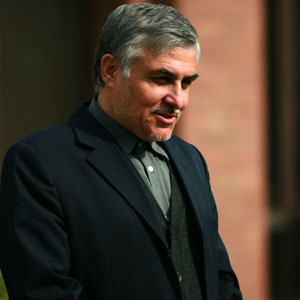They Have Crossed Hizbullah’s Red Line
Interview with former ambassador of Iran to Lebanon

What objectives do Hezbollah and the Amal Movement follow in the current crisis?
You can’t analyze things without looking at the past. A glance at the dissolution of Lebanon’s national unity government that included Hezbollah can uncover the truth.
Hezbollah and the Amal Movement ministers resigned following the differences they had with the prime minister and a part of his cabinet. Ministers affiliated with the Resistance stated that the conditions were intolerable. The cabinet wanted to pass laws which were harmful to the Resistance. The differences spread across the country and continue up to now. But one thing was observed by both the pro-governments and anti-governments: they didn’t cross the red lines.
The recent crisis happened because the Lebanese government, considered illegitimate by its opponents, is acting against the Resistance. It tried to dismantle Hezbollah’s private communications network, its winning card in 2006 war against Israel. That is Hezbollah’s red line and it is also considered a sensitive issue for Israel. As you now in wars with a broad scale, like the one between US and Iraq, communications are highly important. Saddam Hussein couldn’t resist for long against Americans because they diminished the communications network of the Iraqi army. The Iraqi troops fell apart, they lost their communication and commanding power and in a short time they were defeated. Hezbollah is aware of this matter, that’s why it said cabinet’s decision is unacceptable and an instance of crossing the red lines.
As an Iranian, and a diplomat, I don’t want to judge who is right or wrong. But to understand why such crisis surfaced, we can say that for the first time within the past four years the government passed the oppositions’ red line and caused Hezbollah to lose self-control.
Will Lebanon become another Gaza?
That’s so unlikely. The integrated nature of the Lebanese society doesn’t allow such a thing. The majority of Christians are with Hezbollah and the opposition group and the strife is unable to divide the country between the opposing groups. Even during the 1975-1990 civil war no certain part of the country belonged to one group.
I think the recent strife will not turn into a long-term conflict or civil war. It was just a warning given by Hezbollah to other parties not to cross its red lines. I think it made all groups conscious to avoid that, whatever the disputes are.
Two days ago, Deutsche Welle reported that Iran’s ready to cooperate in reducing tensions in Lebanon if the global community accepts its nuclear plans. What do you think?
I’m not in favor of this viewpoint, whether it’s expressed by Iranians or foreigners on developments inside or outside Iran. I believe what happens in Iran and Lebanon is related only to these countries.
There may be warm relations between Iran and Hezbollah or other Lebanese groups, but Iran understands that Lebanon is an independent country where the decisions must be made by the Lebanese groups. As I have known so far, Iran has never taken advantage of Lebanon to solve its nuclear problem, whether in past or present.
What the news agencies reported is absolutely wrong and both Iranian and Lebanese government must stress that developments in Lebanon are a Lebanese problem.
Are the current clashes a prelude to an all-out civil war?
I don’t think so and again I say that the clashes can lead to agreement. Lebanese don’t want to fight with each other forever and they have to live under the country’s flag one day.
So these clashes can either make things more complicated or become an opportunity to solve the problems. The clashes started after Seyyed Hassan Nasrullah’s speech, but Saad Hariri, as a leading figure of the parliament’s pro-government faction, asked for negotiations. What happened can help all parties to understand the developments better and become aware of the danger that lies in continuation of dispute. Be sure that the conflicts in Lebanon will end one day because there’s no other way and marginalizing one side can never be helpful.
So even such problems can be a launch pad for reaching agreements. In an article I wrote before I predicted that the problems continue until the parliamentary elections. I still believe in this but I also think crisis like what happened in these days can’t be continued. As you know Hezbollah has ceded the occupied districts to the army. It just wanted to show it can defend itself and warn the government not to try to disarm the movement.
Iran, Saudi Arabia and France had joint efforts to solve the crisis in Lebanon. What has been the result? Did the efforts continue or they been stopped?
I think every group that has good ties with any party in Lebanon can be helpful to solution of the problems. I have always defended this trend.
During my service as Iran’s ambassador to Lebanon our focus was mostly on use of regional capacities, particularly that of Saudi Arabia, Syria, Iran, Egypt and also France to quell any conflicts between Lebanese groups. But naturally these efforts were more fruitful in the Reform Government, when we had better international and regional ties and also a better position.
Due to misunderstandings between Iran and Saudi Arabia, and lack of warm relations between Ahmadinejhad and Sarkozy –contrary to Khatami-Chirac good ties- things are no going on well, though Iran, Saudi Arabia and France, also other countries such as Syria and Egypt are interested in solution of the problems.

